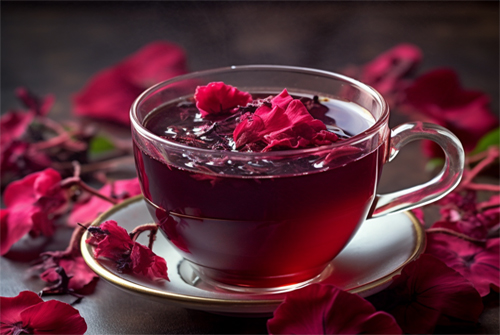Hibiscus Tea
Posted on Sep 16th 2023

Hibiscus Tea: A Dance of Vibrancy and Wellness
Among the vast and diverse universe of herbal teas, hibiscus tea shines brightly with its tantalizing tanginess and ruby-red hue. Often reminiscent of a tropical getaway, this infusion not only delights the palate but also offers a myriad of health benefits. So, let's delve into the enchanting world of hibiscus tea.
A Tapestry of Cultures and Traditions
The hibiscus flower, particularly the Hibiscus sabdariffa species, has been celebrated and utilized across various continents. From Africa, where it’s known as "bissap," to the Caribbean and its "sorrel" drink, to its place in traditional Ayurvedic and Egyptian remedies, hibiscus tea has woven itself into the fabric of many cultures.
Health Benefits and Nutritional Potency
This floral brew is more than just a pretty drink:
- Heart Health: Regular consumption has been linked to reduced blood pressure levels, potentially benefiting those with hypertension.
- Rich in Antioxidants: The vibrant red color is a testament to its wealth of antioxidants, which help combat oxidative stress in the body.
- Liver Health: Some studies suggest hibiscus may support liver function and reduce markers of liver damage.
- Weight Management: There's preliminary evidence suggesting hibiscus tea could assist in weight loss by reducing body fat and BMI.
- Digestive Aid: It can help to soothe the digestive system and alleviate constipation.
Brewing the Scarlet Elixir
For a perfect cup of hibiscus tea:
- Water: Use fresh, cold water to bring out the best flavors.
- Temperature: Once your water reaches a boil, let it cool for about a minute.
- Steeping: Immerse the hibiscus petals (or tea bag) for 5-7 minutes. For a stronger brew, you can steep longer.
- Flavoring: Enhance with a touch of sweetener, be it honey or cane sugar, and maybe a slice of lemon or a stick of cinnamon.
Selecting Hibiscus for Brewing
When seeking out hibiscus:
- Whole vs. Crushed: Whole dried flowers often retain flavor better, but crushed or cut hibiscus is commonly used in pre-packaged tea bags for convenience.
- Organic Varieties: Ensure you're sipping on pesticide-free petals.
A Gentle Reminder
While hibiscus tea is generally safe and beneficial for many, its effect on lowering blood pressure means those already on hypertension medication or pregnant women should consult with healthcare professionals before regular consumption.
Conclusion
Hibiscus tea, with its arresting color and unique tart flavor, is more than just a drink – it's an experience, a ritual, and a wellness companion. Whether you're drinking it for health, as a delightful summer cooler, or a warm winter beverage, hibiscus tea promises a dance of vibrancy in every sip.
 Loading... Please wait...
Loading... Please wait...